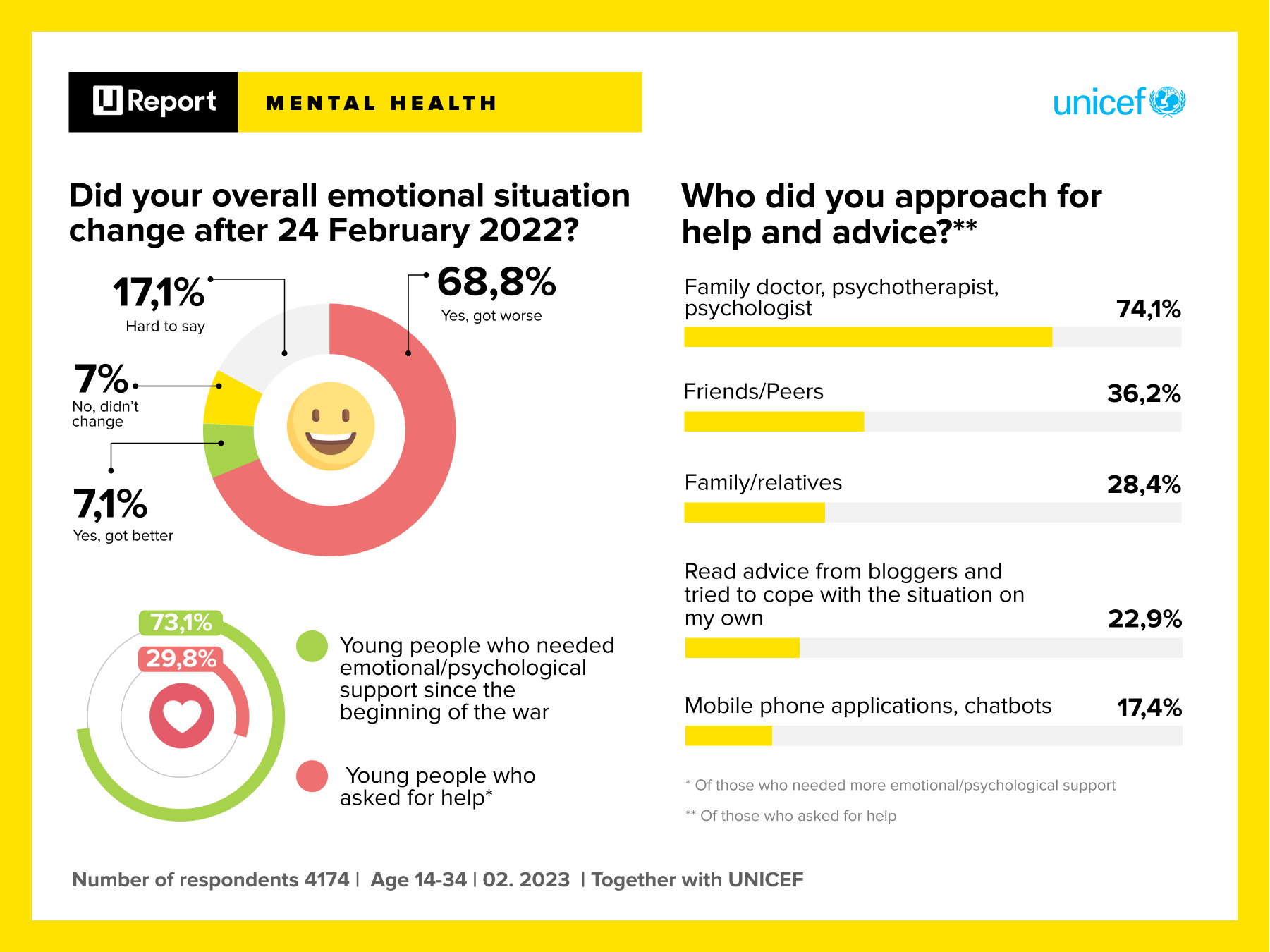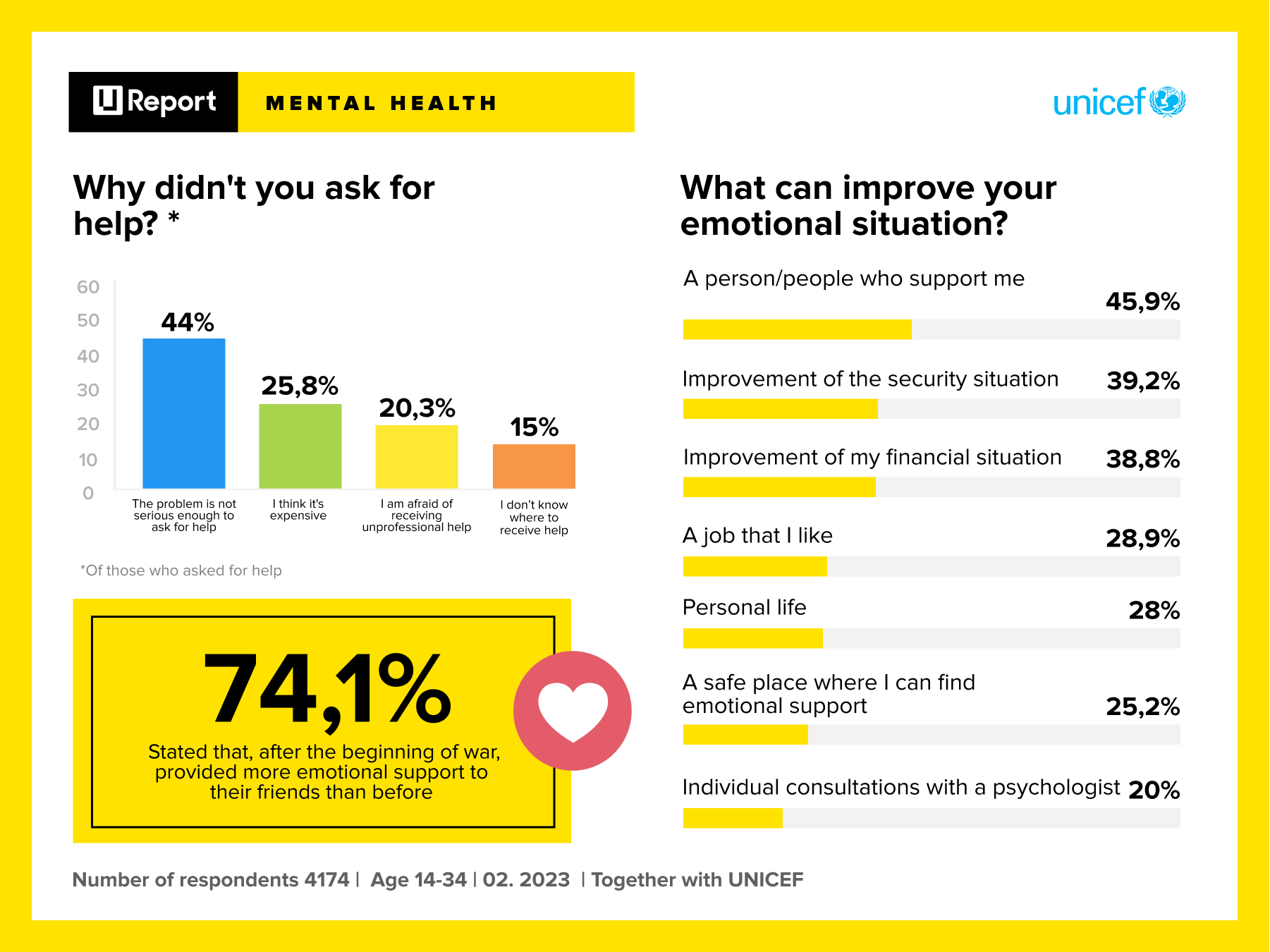How and to what extent did last year’s events in Ukraine affect the psychological state of Ukrainian youth? We analyze the findings of the U-Report survey on the mental health of young Ukrainians.
Against the backdrop of the war, related life challenges, material and work issues, and constant worry for themselves and their loved ones, young people often forget to take care of their mental health.
U-Report decided to examine deeper the mental health issues of Ukrainian youth to find out how the psychological state of young people changed after February 24, 2022, and also ask them how they coped with mental health problems. The survey was conducted using the @UReportUkraineBot chatbot and is not representative.
After February 24, 2022, the emotional state of most young people (69%) worsened. Only 7% of respondents noted an improvement in their emotional state, and 7% experienced no changes. 17% could not decide on the answer.
Over the past year, 55% of young Ukrainians experienced anxiety, 25% had depression, and 9% remained calm.
56% of respondents sought information and tried to find out how to improve their mental health, while 44% did not receive or were not interested in getting such information.
73% of young people said they needed more emotional or psychological support. However, only 30% of respondents sought psychological help, and 70% did not.
At the same time, 74% of young people began to provide more emotional support to friends and relatives with the beginning of the war.
74% of respondents from those who did seek help visited a family doctor, psychologist, or psychotherapist. 36% turned to friends or peers for advice, and 28% to relatives. 40% of young people sought advice from bloggers, social networks, articles, and thematic apps on the phone or chatbots.
Why did the youth not ask for help?
Among those who did not seek help, 44% believed their psychological problems were not serious enough to require outside help. 26% feared such help would entail significant expenses, and 20% feared receiving unqualified psychological help. 15% of respondents did not know where to get psychological support, and 8% did not believe in the effectiveness of such assistance or support.
Nadiia Rohozina, a clinical psychologist and the founder of Svitlo.App, comments on the situation:
“There’s such a cultural peculiarity in Ukraine: not admitting you need help. Let’s start with the fact that talking to a professional psychologist wouldn’t hurt anybody. For example, a psychologist can help determine whether deeper assistance is needed or if a single conversation is enough. Overall, working preventively and not waiting for things to get heated enough to require “psychological resuscitation” is much more effective. You should recognize the moment when you need help – when it becomes difficult for you to perform your everyday functions: working, sleeping, building relationships, acting, or taking care of yourself daily (washing, eating regularly, etc.).”
What can improve young people’s emotional state?
46% cited communication with a supportive person as the reason for improving their mood. 39% think an improved security situation brings calm and a stable emotional state, with another 39% believing it is an improved financial situation. 28% of respondents named their personal life or work as reasons for improving their emotional state, with 20% naming psychological counseling and 19% sports.
What should you pay attention to in order to understand that you or your loved ones are “not OK”?
Nadiia Rohozina advises that attention be primarily paid to yourself. The classic “put your oxygen mask on first” also works here. If you feel you are not OK, you should not get involved in supporting others because you might even put them in harm’s way.
The next thing to pay attention to is changes. These can be changes in behavior: you or another person becomes less responsible, might not keep promises, or distance yourself from others. Or vice versa: you show excessive diligence, give up sleep in favor of tasks, or cannot stop). It can be your emotional state (long depression, irritability, aggression, anxiety, or vice versa — excessive emotional excitement), cognitive functions (forgetfulness, inability to focus, difficulty making decisions). However, if someone has been hot-tempered all their life, everything is fine with them. Attention should mainly be paid to the changes.
The listed reactions are utterly normal per se and expected due to stress. But if they last for several weeks or create excessive discomfort in life, then we can talk about psychological difficulties of a more complex nature.
Attention
The authors do not work for, consult to, own shares in or receive funding from any company or organization that would benefit from this article, and have no relevant affiliations





